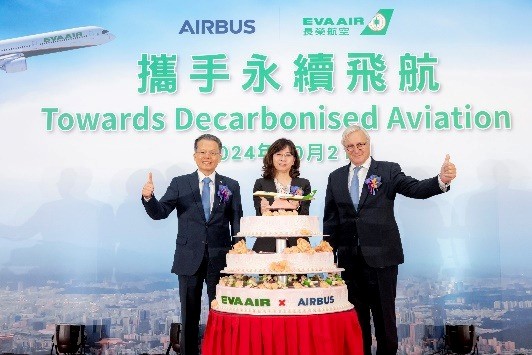EVA Air, Taiwan’s independent airline, and Airbus have embarked on a collaborative effort aimed at increasing SAF development and adoption in the airline’s operations.
The announcement was made during a ceremony in Taipei to celebrate EVA Air’s order of 18 long-range A350-1000 and 15 single-aisle A321neo aircraft, in the presence of EVA Air President Clay Sun, CEO of Airbus Commercial Aircraft Christian Scherer, Taiwan Civil Aviation Administration Director-General Ho Shu-Ping, European trade office representatives, and guests from the Taiwanese travel and cargo industries.
Clay Sun, President, EVA Air said: “Fuel efficiency, carbon reduction and cabin comfort have become major considerations for airline fleet modernisation, and EVA Air’s announcement late last year to introduce the 33 latest-generation Airbus aircraft underlines our plans to meet future demand.
“Both companies are working closely in a strategic partnership to promote the use of sustainable aviation fuel and explore more innovative technologies and operational optimisation solutions. These efforts will ensure that we can steadily move towards a Net Zero future.”
Christian Scherer, CEO, Airbus Commercial Aircraft said: “The aircraft orders we celebrate today elevate the partnership we have with EVA Air to a whole new level.
“The A350-1000 is the undisputed choice in the large capacity intercontinental segment, with unmatched passenger comfort and an environmental signature superior to any aircraft in its class, present or planned.
“This allows EVA Air to set new standards for its long-haul operations. In alignment with Airbus’ ambition to decarbonise aviation, we are also deepening our collaboration to explore ways for EVA Air to reduce carbon emissions across its operations and prepare for the future adoption of SAF.”
Working closely with EVA Air, Airbus will analyse potential contributions of various measures based on current and future routes, as well as operational practices.
The two parties will also study the required measures to prepare for the uptake of SAF on commercial flights, establish procurement processes, manage SAF certification, as well as promote awareness on regular SAF usage.




